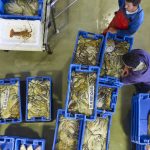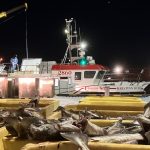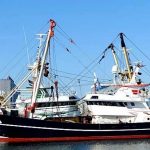A £9.3 million funding package has been announced from the European Fisheries Fund (EFF), taking the total level of EFF investment for 2009 to more than £25 million.
It will be used to strengthen Scotland’s processing sector, secure jobs in remote areas, trial new technologies, improve the efficiency of the fishing industry, and enhance the nation’s reputation as a land of food and drink.
Young skippers looking to secure a share in their own vessels and small firms affected by the Infectious Salmon Anaemia (ISA) outbreak earlier this year are among the successful applicants.
The announcement comes hard on the heels of yesterday’s first meeting of the Ministerial Group on Aquaculture (MGA), at which the industry set out a number of steps to put the sector on firm footing.
In excess of 1,000 jobs will be created and safeguarded as a result of this latest round of funding. Some of the successful awards include:
£200,000 to help eight young fishermen buy a share in their vessels
An additional £360,000 to improve training across the catching sector
Ten aquaculture projects will receive over £1.4 million to help cope with the aftermath of ISA and support 50 new jobs
Over £350,000 for mussel farming and processing projects on the west coast and Western Isles
Fisheries Secretary Richard Lochhead said:
“Fishing is a key industry for Scotland supporting many coastal and rural communities. Taken together, fisheries, fish farming and processing generate over £1 billion each year for the Scottish economy.
“There is no question that 2009 has been a difficult year for some fleets, and 2010 will also be challenging. This funding provides further evidence that we will stand shoulder to shoulder with our fishing industry and processors and are determined to maximise the value of the catch and help them to achieve greater profitability.
“The substantial funding to improve training and encourage more young skippers into the industry is particularly encouraging.
“Despite the difficult climate there is still much to proud of. Our pelagic sector for example is thriving, almost two-thirds of our most important stocks where the scientific status is known are being fished sustainably and over half of Scottish fisheries by value are accredited by the MSC.
“The key now is to build on this impressive progress. This latest investment, a new Eat More Fish campaign and our first ever national food and drink policy with seafood at the centre can help us achieve that goal.”
Environment Minister Roseanna Cunningham said:
“The aquaculture industry is the lifeblood of many rural and coastal communities and widely regarded as the only way of meeting the growing global demand for seafood.
“Our new Ministerial Group on Aquaculture is reviewing the containment and treatment of ISA. We are backing this up with substantial investment to help those firms affected by the outbreak get back on their feet. I am also very pleased that Scotland’s growing shellfish sector stands to benefit from this latest round of funding.
“The Ministerial Group is committed to supporting and developing Scotland’s thriving aquaculture sector. It is clear that the group’s members are mapping out a successful and sustainable future for one of Scotland’s major success stories in recent years.”
Ian Gatt, President of the Scottish Fishermen’s Federation, said:
“This funding provides a welcome boost to the fishing industry and will support a number of worthwhile projects, including the encouragement of new entrants into the industry and the provision of essential safety training for fishermen.
“We are also delighted at the funding support for the new and upgraded FishSAFE unit, which we believe will play a vital role in ensuring the safety of fishing vessels whilst conducting their everyday operations.”
Scott Landsburgh, Chief Executive of the Scottish Salmon Producers’ Organisation, said:
“We welcome this Government support for companies most affected by the fish health problems earlier this year which also had a significant effect on the economy in Shetland at that time. This funding assistance will help companies get back on track with their programmes to invest in new equipment, staff training and implement collaborative projects. In turn this will benefit fish health and welfare, contribute to sustainable industry development and hopefully safeguard jobs and the local economy.”








